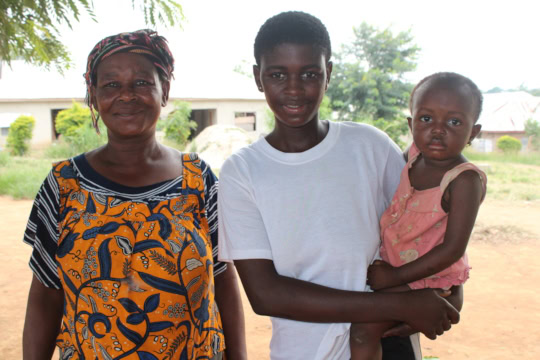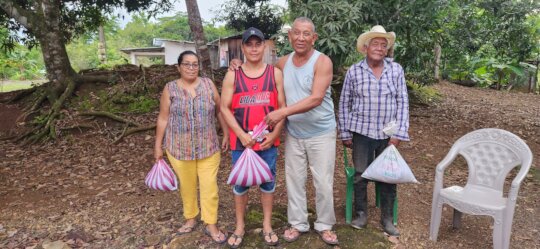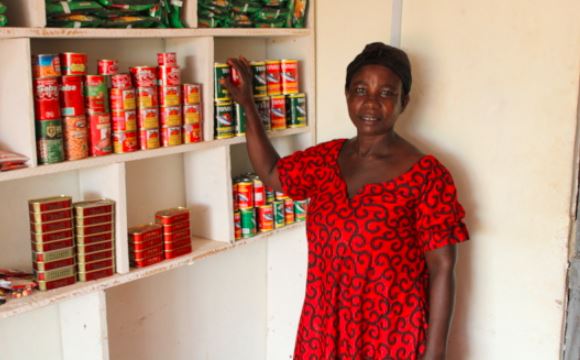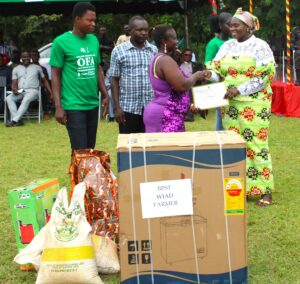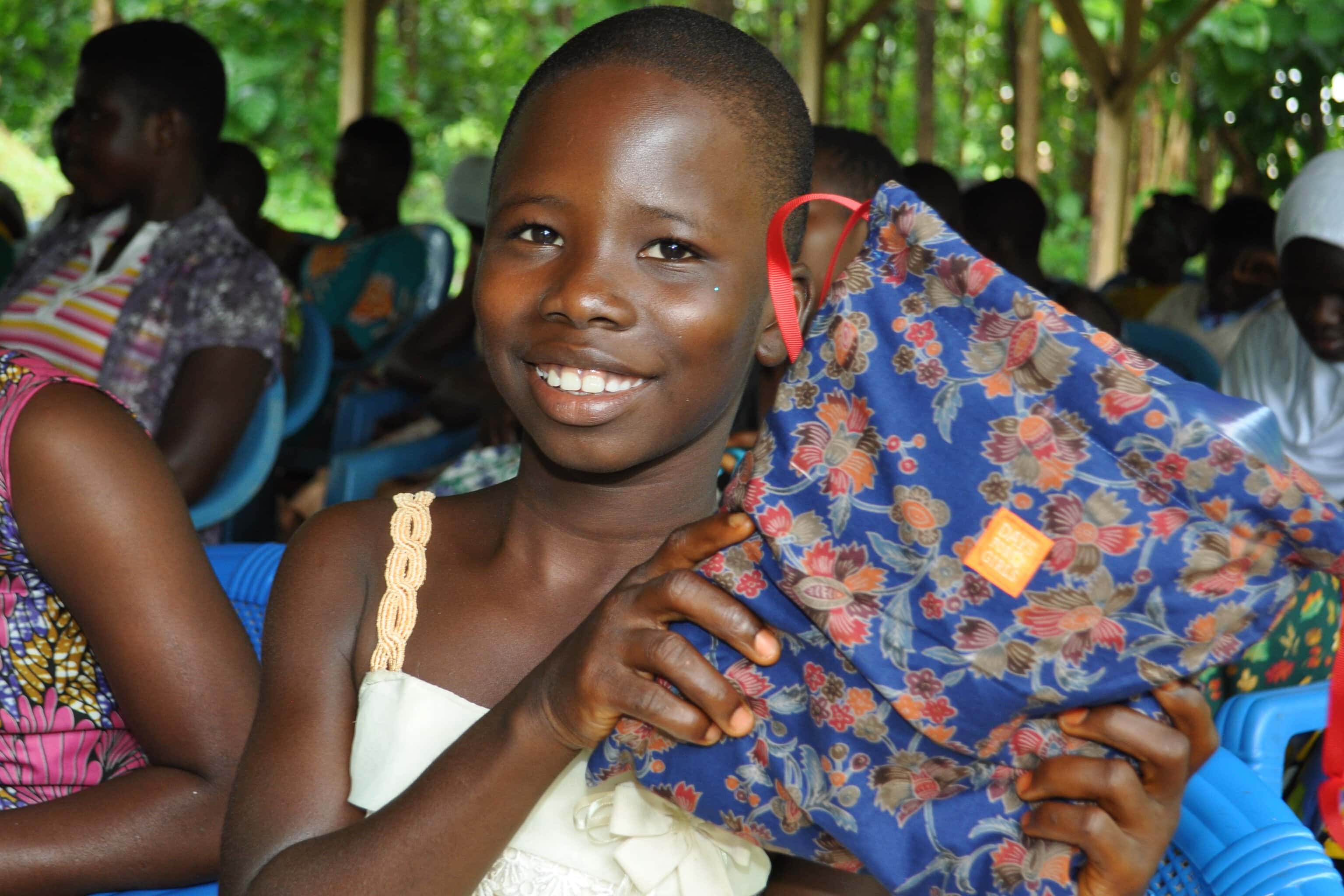
Is it safe to eat eggs when you have your period?
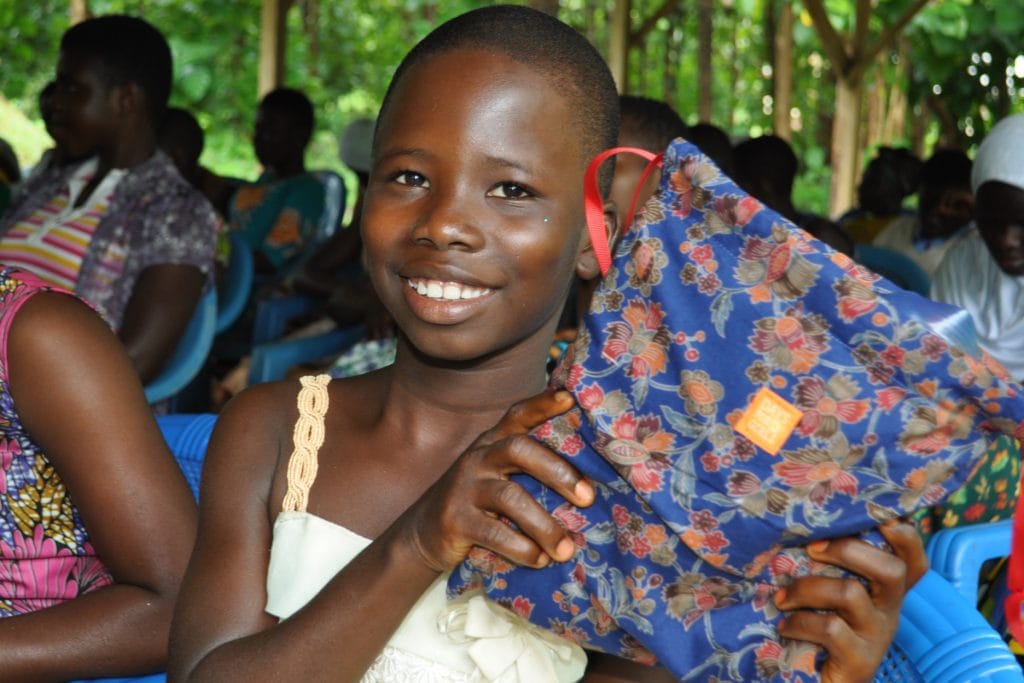
My period won’t make me skip school anymore
That was one of the genuine questions asked during the women’s health training session we held in Timeabu last week: “Is it safe to eat eggs when you have your period?” I was visiting our team in Ghana, and was lucky to have a particularly talented group traveling with me to teach teen girls in Ghana about women’s health and inaugurate the new Teen Girls Clubs in three villages.
Karen Skovgard and Margy Towers, both retired educators, had taken the Days for Girls online training course in women’s health, as had our local staff, Victoria and Elizabeth. We arrived to Timeabu village that morning and found more than one hundred teens girls from three villages gathered with their mothers (and a few grandmothers) to learn about about puberty, what happens in a woman’s changing body, what to expect, and how to manage monthly menstruation in a safe and hygienic way.
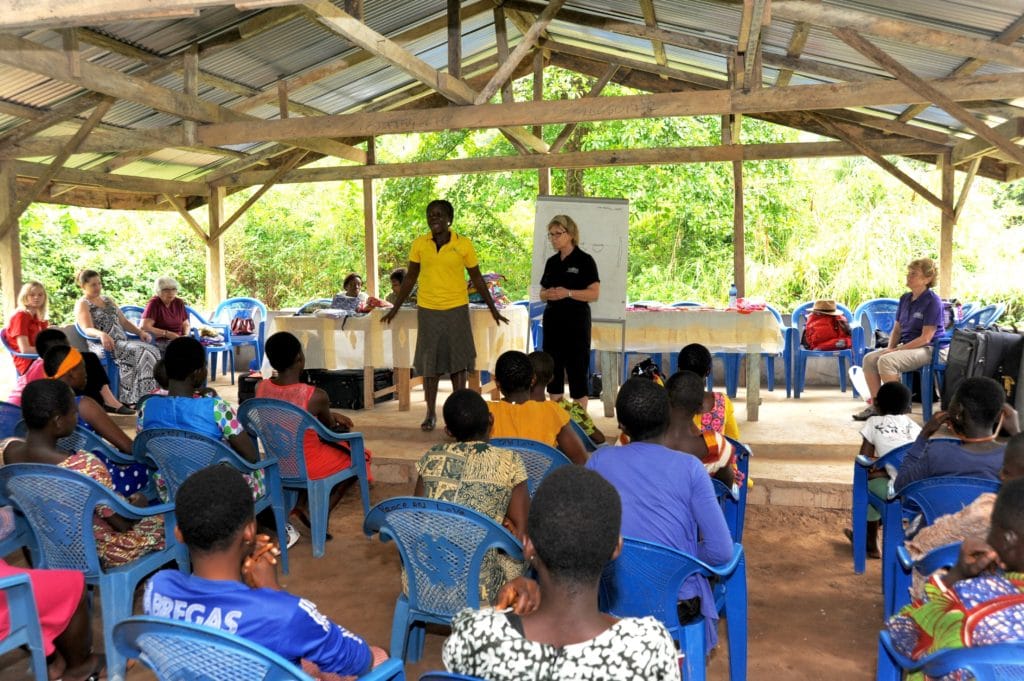
Victoria and Margy discuss women’s health
Together, the four women taught the lesson in both English and Twi, the local language, Twi, to ensure that they fully understood the information being shared. Women of all ages listened attentively. No one had ever taught them about their bodies before.
A little while into training session, a rain storm came through and the noise from the drops on the tin roof made even yelling the training information futile, so we took a lunch break. Once everyone had eaten, we began a review of the morning’s lessons, and the girls stood and repeated back to us all they had learned – they didn’t miss a thing, and we had covered a lot!
They concluded the health training portion of the program, highlighting strategies for girls to stay safe from sexual violence (such as walking in groups), while emphasizing that if a girl is attacked while walking alone, it is not her fault. Studies indicate that women in Ghana are most at risk of sexual violence between the ages of 10 – 18 years old, and that for 20% of women in Ghana, their first experience of sex was against their will. If that trend continues, it means that 25 of the girls in that room have had or will have an involuntarily first sexual experience. Experiencing sexual violence is not the victim’s fault.
Then the girls (and several mothers) began asking questions. Is it safe to eat eggs when you have your period? Should you drink charcoal? Is it safe to bathe? They were eager to learn scientifically based knowledge about their bodies, how to manage cramps, how to stay safe and healthy, what does and doesn’t work.
When all questions were answered, we introduced the Days for Girls kits. Each kit contains panties, two reusable, waterproof shields that snap around panties, and washable inserts that together function as reusable pads. They come in a cute backpack that the girls can carry to school each day, so no one needs to know what’s inside – sanitary supplies, school supplies, or anything else they may need that day. They also include a washcloth, soap, and plastic bags so you can soak and soiled inserts without any mess. They’ve been designed and re-designed with comfort and practical use in mind. These particular kits were made by volunteer sewing groups from Des Moines and Cedar Falls, Iowa (special thanks to Kay Hertz and her whole team for their countless hours of kit construction!).
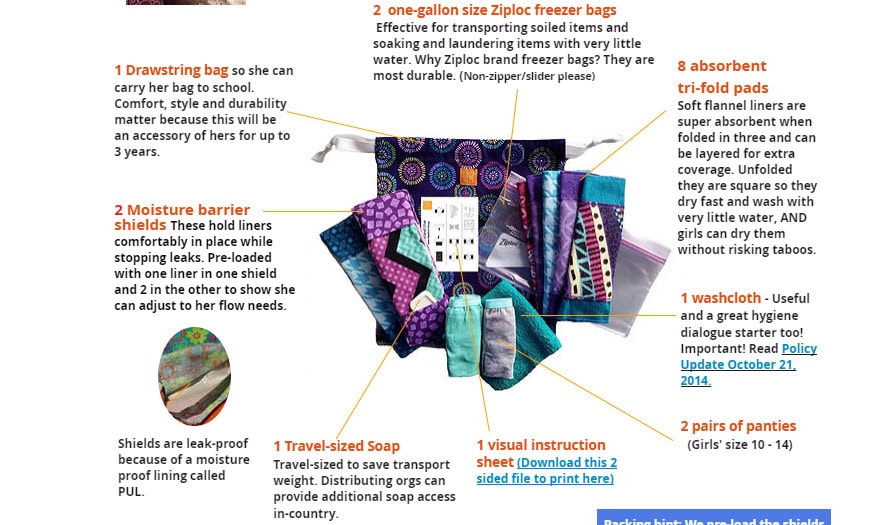
Days for Girls Feminine Hygiene Kit
We taught the girls how to use and care for the kits. Kelly, a 16-year-old volunteer from California, demonstrated how to snap the pad around the panties in a particularly comical way. She stood on the stage, stepped into the panties, “realized” the girls wouldn’t be able to see the demonstration with her long skirt on, and dropped her skirt! It took a moment for the girls to realize she was wearing shorts underneath her skirt and then the laughter erupted! She pulled the pad and panties up over her shorts and laughter continued – and the girls made a connection. Anywhere in the world, 16-year-olds aren’t so different. She was a hit the rest of the week.
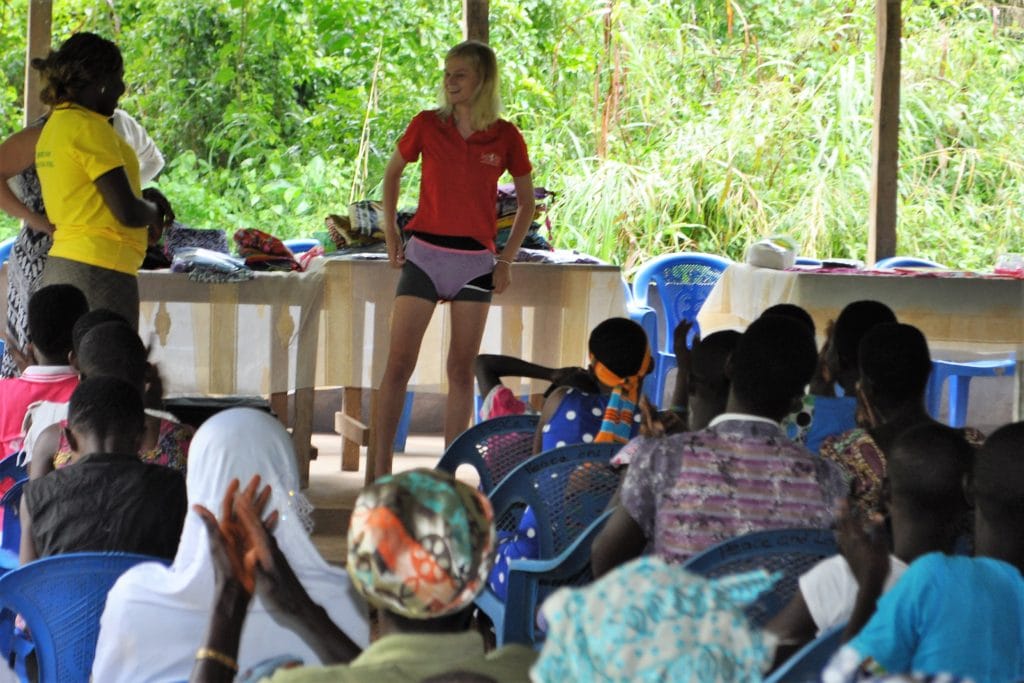
Kelly demonstrates amid laughter and applause
After the demonstration, we sorted the kits by panty size, and each girl was given a kit to correspond to her current size. Each kit was a different color of fabric, and the girl’s name was written inside so she wouldn’t lose it. This was hers, not anyone else’s. I was amazed that not one of the girls asked for a different color – they were just so grateful – and eager to return to their seats and look through the kits themselves.
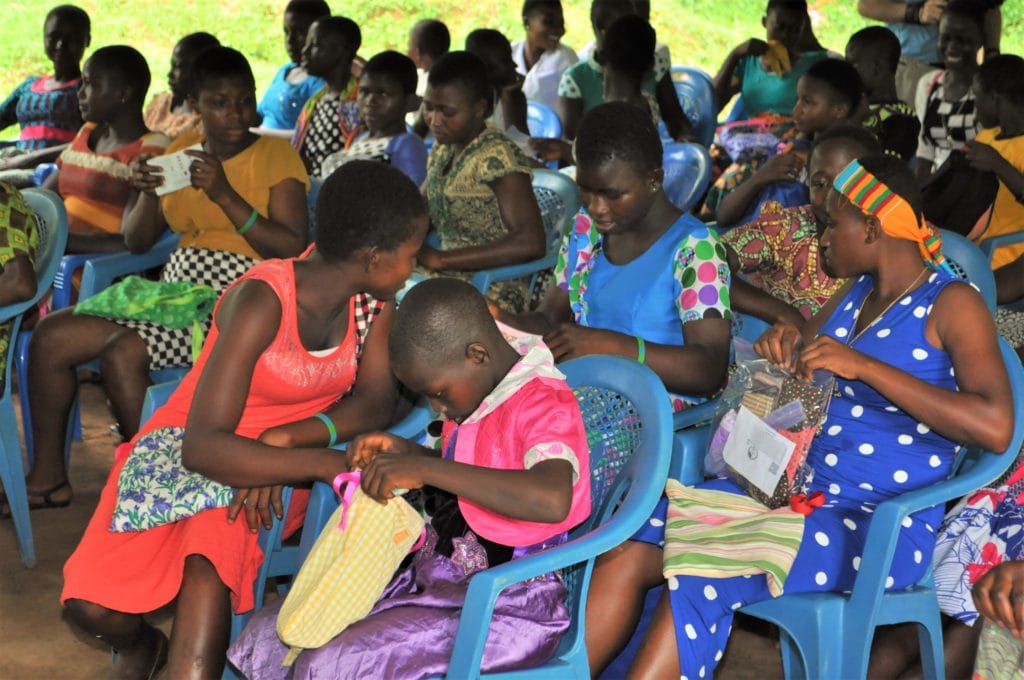
Checking out their new Days for Girls kits
We’d taken enough kits that there were several left over at the end of the distribution, even factoring in the ones that would be distributed to girls who would attend a “make up session” of the training and get the kits later in the week. The mothers and grandmothers present – may of whom serve as leaders of the teen clubs – asked if they would be able to have a kit, and we were glad to be able to offer the kits to them too.
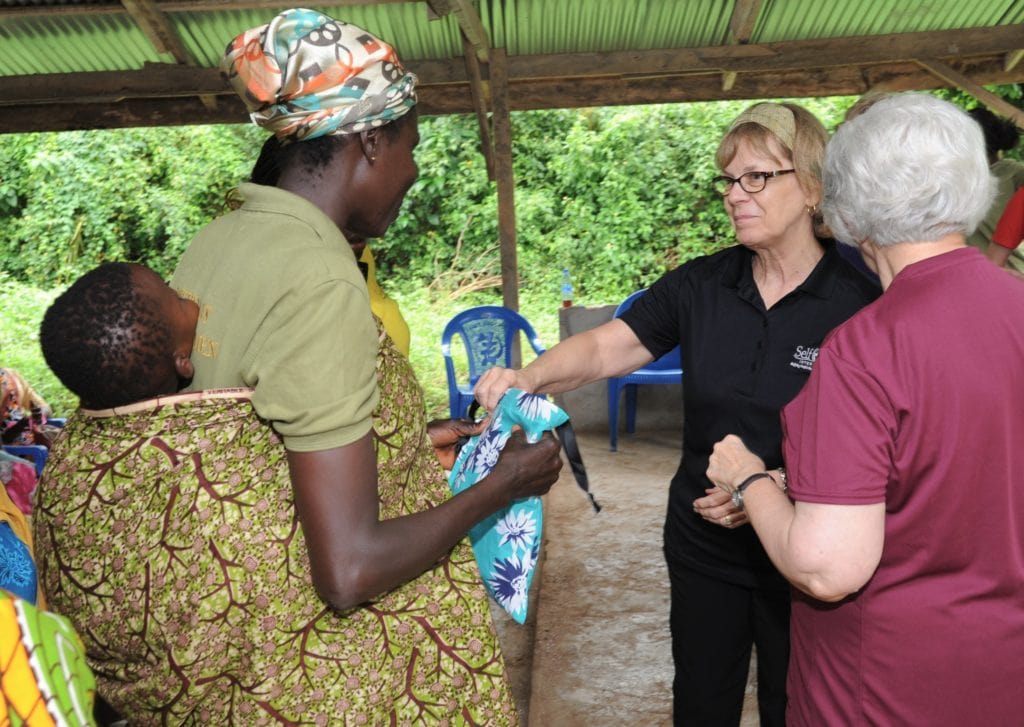
Even the mothers of the teens wanted kits!
As more people learn about the kits and there is a greater demand for them, we plan to offer a sewing training course to teach local seamstresses in Ghana how to construct the kits themselves. That will both create a new income source or enterprise for local women and ensure that all women and girls in the area have access to the kits and aren’t dependent on Self-Help to bring them over.
Before we left for the day, the girls shared with us the Teen Girls Club slogan: “Girls stand for education, empowerment, and fairness!” See it for yourselves on our Instagram page.
When I asked Victoria and Elizabeth about the slogan, they said, “We want the girls to focus on their education, and to know that men and women can equally do their best wherever they find themselves…We talk about fairness in the sense of gender fairness. Girls should not think of themselves as lower than boys. They are special too and they should feel free to shine wherever they are!”
They should indeed. Stay tuned for the story of the official program launch that took place a few days later!
Building goodwill and better friendships

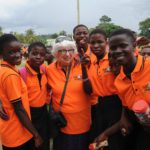 Next Post
Next Post